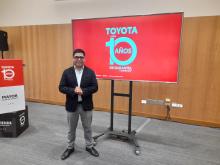"The only reason why we have not closed the agreement with the European Union is because the Europeans have not yet managed to resolve their own internal contradictions," said the president of Brazil, Luiz Inácio Lula da Silva during his speech, in which he spoke of the achievements of the South American bloc during Brazil's presidency last year.
Mercosur leaders on Monday shared their pessimism about negotiations to reach a long-delayed trade agreement with the European Union and attributed the obstacles to internal problems in the European bloc.
The presidents of Brazil, Uruguay and Paraguay met in the Paraguayan capital to hold a semi-annual summit of the group in which Argentina was represented by its foreign minister.
"The only reason why we have not closed the agreement with the European Union is because the Europeans have not yet managed to resolve their own internal contradictions," said the president of Brazil, Luiz Inácio Lula da Silva during his speech, in which he spoke of the achievements of the South American bloc during Brazil's presidency last year.
The agreement between the EU and Mercosur has been negotiated for more than 20 years. In 2019 the blocs even signed a version that was not ratified due to the tense relationship of Jair Bolsonaro's government with the Europeans, the increase in deforestation and Brazil's failure to comply with environmental standards.
And although negotiations reopened in March 2023, new tensions have arisen and are currently at a standstill.
In turn, the president of Uruguay, Luis Lacalle Pou, criticized the proposal of some European presidents to return negotiations to zero.
"It doesn't seem logical after 25 years (...) I don't know if it is the European electoral processes, the changes we are experiencing, the rulers who speak to their electorates or their pressure groups... that make progress difficult" .
"And these changes, the French election the other day, those of other countries that are taking place, suggest that there is no logical line of progress in the agreement," he added.
In this context, the leaders highlighted an external agenda that included the start of negotiations for a trade agreement with the United Arab Emirates and rapprochement with Central American countries such as Panama, which had its president José Raúl Mulino as a guest at the summit.
SUPPORT FOR BOLIVIA
In his speech at the summit, Lula also warned that the bloc's members must be "vigilant" in the face of threats to the democratic institutions of the countries in the region, mentioning the attempted coup d'état in Bolivia on June 26 and the attack against institutions in Brasilia last year.
"The unanimous reaction to June 26 in Bolivia and January 8 in Brazil shows that there are no shortcuts to democracy in our region. But we must remain vigilant. False democrats try to undermine institutions and put them at the service of reactionary interests," Lula stated.
The president also praised Bolivia's full membership in the bloc for its "enormous strategic value."
Not attending the summit was Argentine President Javier Milei, who has been exchanging criticism with Lula since taking office in December. The ultraliberal Argentine leader was in Brazil over the weekend for a conservative event and met with Bolsonaro.










